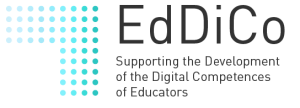Gamification
To use gamification elements such as challenges, competitions, points, badges, and leaderboards to make the learning experience more enjoyable and the learning outcome more sustainable. (our own suggestion)
To use gamification elements such as challenges, competitions, points, badges, and leaderboards to make the learning experience more enjoyable and the learning outcome more sustainable. (our own suggestion)
To use digital technologies to support self-regulated learning processes, i.e. to enable learners to plan, monitor and reflect on their own learning, provide evidence of progress, share insights and come up with creative solutions. (DigCompEdu)
To use digital technologies to foster and enhance learner collaboration. To enable learners to use digital technologies as part of collaborative assignments, as a means of enhancing communication, collaboration and collaborative knowledge creation. (DigCompEdu)
To use digital technologies and services to enhance the interaction with learners, individually and collectively, within and outside the learning session. To use digital technologies to offer timely and targeted guidance and assistance. To experiment with and develop new forms and formats for offering guidance and support. (DigCompEdu)
To plan for and implement digital devices and resources in the teaching process in order to enhance the effectiveness of teaching interventions. To appropriately manage and orchestrate digital teaching interventions. To experiment with and develop new formats and pedagogical methods for instruction. (DigCompEdu)
To identify, assess and select digital resources for teaching and learning. To consider the specific learning objective, context, pedagogical approach, and learner group, when selecting digital resources and planning their use. (DigCompEdu)
To use digital sources and resources for continuous professional development. (DigCompEdu)
To individually and collectively reflect on, critically assess and actively develop one’s own digital pedagogical practice and that of one’s educational community. (DigCompEdu)
To use digital technologies to engage in collaboration with other educators, sharing and exchanging knowledge and experiences and collaboratively innovating pedagogic practices. (DigCompEdu)
To use digital technologies to enhance organisational communication with learners, parents and third parties. To contribute to collaboratively developing and improving organisational communication strategies. (DigCompEdu)
Supporting the Development and Certification of the Digital Competences of Educators – EdDiCo
Project Ref: 2019-1-DE01-KA203-005070
This project has been funded with support from the European Commission. This website reflects the views only of the authors, and the Commission cannot be held responsible for any use which may be made of the information contained therein.

